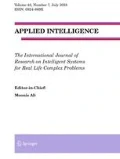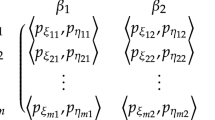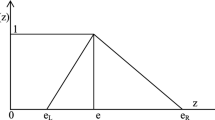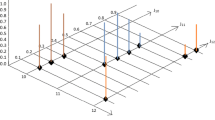Abstract
The matrix game and bi-matrix game are typical non-cooperative games. Nowadays, interactive game decisions on social management are mainly concerned, especially when players are faced with uncertain payoffs. The aim of this paper is to develop simple and effective parameterized linear programming methods for solving two types of matrix games with payoffs expressed by intuitionistic fuzzy (IF) information. In these methods, the expected values of players are regarded as monotonic functions with their risk preferences. Hereby we construct two models of auxiliary bilinear programming, and the corresponding optimal strategies can be easily obtained by explicit computation. The models and methods proposed in this paper are applied in two ecological management problems, and the validity and applicability are verified.
Similar content being viewed by others
References
Paulson EC, Linkov I, Keisler JM (2016) A game theoretic model for resource allocation among countermeasures with multiple attributes. Eur J Oper Res 252(2):610–622
Yue Q, Zhang L, Yu B, Zhang LJ, Zhang J (2019) Two-sided matching for triangular intuitionistic fuzzy numbers in smart environmental protection. IEEE Access 7:42426–42435
Nazari S, Ahmadi A, Kamrani Rad S, Ebrahimi B (2020) Application of non-cooperative dynamic game theory for groundwater conflict resolution. J Environ Manag 270:110889
Xue L, Sun C, Yu F (2017) A game theoretical approach for distributed resource allocation with uncertainty. Int J Intell Comput Cyber 10(1):52–67
Liu J, Zhao W (2016) Cost-sharing of ecological construction based on trapezoidal intuitionistic fuzzy cooperative games. Int J Environ Res Public Health 13(11):1102
Yang J, Kilgour DM (2019) Bi-fuzzy graph cooperative game model and application to profit allocation of ecological exploitation. Int J Fuzzy Syst 21(6):1858–1867
Zadeh LA (1965) Fuzzy sets. Inf Control 8(3):338–353
Atanassov KT (1986) Intuitionistic fuzzy sets. Fuzzy Sets Syst 20(1):87–96
Bustince H, Barrenechea E, Pagola M, Fernandez J, Xu Z, Bedregal B, Montero J, Hagras H, Herrera F, de Baets B (2016) A historical account of types of fuzzy sets and their relationships. IEEE Trans Fuzzy Syst 24(1):179–194
Li DF, Nan JX (2009) A nonlinear programming approach to matrix games with payoffs of Atanassov’s intuitionistic fuzzy sets. Int J Uncertain Fuzziness Knowl Based Syst 17(4):585–607
Li DF, Liu JC (2015) A parameterized nonlinear programming approach to solve matrix games with payoffs of I-Fuzzy numbers. IEEE T Fuzzy Syst 23(4):885–896
Yang J, Li DF, Lai LB (2016) parameterized bilinear programming methodology for solving triangular intuitionistic fuzzy number bimatrix games. J Intell Fuzzy Syst 31(1):115–125
Xu Z (2007) Intuitionistic preference relations and their application in group decision making. Inf Sci 177(11):2363–2379
Meng F, Tang J, Fujita H (2019) Linguistic intuitionistic fuzzy preference relations and their application to multi-criteria decision making. Inform Fusion 46:77–90
Zhai Y, Xu Z, Liao H (2018) Measures of probabilistic interval-valued intuitionistic hesitant fuzzy sets and the application in reducing excessive medical examinations. IEEE Trans Fuzzy Syst 26(3):1651–1670
Fujita H, Gaeta A, Loia V, Orciuoli F (2020) Hypotheses analysis and assessment in counter-terrorism activities: a method based on OWA and fuzzy probabilistic rough sets. IEEE Trans Fuzzy Syst 28(5):831–845
Xu Z (2005) Extended C-OWA operators and their use in uncertain multi-attribute decision making. Syst Engine Theo Pract 25(11):7–13
Xu Z, Cai XQ (2008) Intuitionistic fuzzy information: aggregation theory and applications, science press, Beijing. Springer, New York
Hao Z, Xu Z, Zhao H, Fujita H (2018) A dynamic weight determination approach based on the intuitionistic fuzzy Bayesian network and its application to emergency decision making. IEEE Trans Fuzzy Syst 26(4):1893–1907
Son L, Ngan RT, Ali M, Fujita H, Priyan MK (2019) A new representation of intuitionistic fuzzy systems and their applications in critical decision making. IEEE Intell Syst 35(1):6–17
Xu Z, Chen J (2008) An overview of distance and similarity measures of intuitionistic fuzzy sets. Int J Uncertain Fuzz 16(4):529–555
Aggarwal A, Mehra A, Chandra S (2012) Application of linear programming with I-fuzzy sets to matrix games with I-fuzzy goals. Fuzzy Optim Decis Making 11:465–480
Yang J, Fei W, Li DF (2016) Non-linear programming approach to solve bi-matrix games with payoffs represented by I-fuzzy numbers. Int J Fuzzy Syst 18(3):492–503
Li DF (2010) Mathematical-programming approach to matrix games with payoffs represented by Atanassov’s interval-valued intuitionistic fuzzy sets. IEEE Trans Fuzzy Syst 18(6):1112–1128
Nan JX, Zhang L, Li DF (2019) The method for solving bi-matrix games with intuitionistic fuzzy set payoffs. In: Li DF (ed) Game theory, Communications in Computer and Information Science. Springer, Singapore
Xu Z, Yager RR (2006) Some geometric aggregation operators based on intuitionistic fuzzy sets. Int J Gen Syst 35:417–433
Chen SM, Tan JM (1994) Handling multicriteria fuzzy decision-making problems based on vague set theory. Fuzzy Sets Syst 67:163–172
Yager RR (2004) OWA aggregation over a continuous interval argument with applications to decision making. IEEE Trans Syst Man Cybern Part B 34(5):1952–1963
Owen G (1982) Game theory, 2nd edn. Academic Press, New York
Mangasarian OL, Stone H (1964) Two-person nonzero-sum games and quadratic programming. J Math Anal Appl 9:348–355
Nash JF (1950) Equilibrium points in n-person games. Proc Natl Acad Sci U S A 36:48–49
Vijay V, Chandra S, Bector CR (2005) matrix games with fuzzy goals and fuzzy payoffs. Omega 33:425–429
Acknowledgments
This work presented in this paper is supported by the Science Foundation of Ministry of Education of China (No.19YJC630201), the China Postdoctoral Science Foundation (No.227348), and the Program for Distinguished Young Scholars in University of Fujian Province (No. K80SCC55A). We appreciate the comments and suggestions will give by the reviewers and editor of this journal.
Author information
Authors and Affiliations
Corresponding author
Additional information
Publisher’s note
Springer Nature remains neutral with regard to jurisdictional claims in published maps and institutional affiliations.
Rights and permissions
About this article
Cite this article
Yang, J., Xu, Z. & Dai, Y. Simple noncooperative games with intuitionistic fuzzy information and application in ecological management. Appl Intell 51, 6685–6697 (2021). https://doi.org/10.1007/s10489-021-02215-7
Accepted:
Published:
Issue Date:
DOI: https://doi.org/10.1007/s10489-021-02215-7




